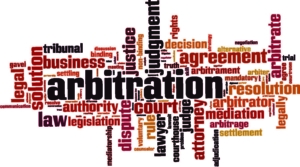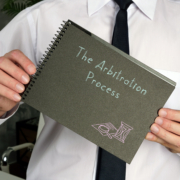Non-Binding Arbitration in Florida: An Increasingly Popular Option for Resolving Disputes
When disputes arise, finding a timely and cost-effective resolution is often a top priority for all parties involved. One alternative to traditional litigation is arbitration, and in Florida, non-binding arbitration offers a unique option. While binding arbitration has the power to make decisions that the parties must adhere to, non-binding arbitration in Florida allows for a more flexible approach to dispute resolution. Although it is not used consistently across all jurisdictions in the State, many Courts in Florida are increasingly requiring parties to attend both mediation and non-binding arbitration prior to trial. For the Courts, this provides a way to reduce ever increasing caseloads and clogged trial dockets. For the parties, it provides a quicker and often inexpensive way to resolve the case, short of a trial.
What is Non-Binding Arbitration?
Non-binding arbitration is a form of alternative dispute resolution (ADR) where an impartial third-party arbitrator hears the case and makes a recommendation. Sometimes there is one arbitrator and other times there is a panel of arbitrators, usually up to three. However, unlike binding arbitration, the decision (or award) rendered by the arbitrator is not final or binding unless the parties elect to make it so. This means that the parties involved in the dispute have the option to accept the arbitrator’s recommendation, negotiate further, or take the matter to court if they are unsatisfied with the outcome. In Florida, non-binding arbitration is often used in civil disputes, including personal injury cases, property damage cases, contract disagreements, and family law matters.
There are specific rules, however, as it relates to non-binding arbitration in Florida that litigators should be aware of. A recent excellent overview of these rules, procedures and other concepts to consider when handling a non-binding arbitration in Florida is provided by Tiffany Hamilton, Esq. in “Non-Binding Arbitration: Tools for Your ADR Toolbox”, Volume 11 of the Stetson Journal of Advocacy and the Law, 11 Stetson J. Advoc. & L. 207 (2024)[i]. In this article, Ms. Hamilton reviews the authority providing for the use of nonbinding arbitration in Florida and offers strategic points to consider when choosing an arbitrator, drafting the argument and more. In addition, practical materials such as Continuing Legal Education seminars from the Florida Bar can provide an overview of the nonbinding arbitration process for those that have not dealt with it before.[ii]
Recent changes to the Florida Rules of Civil Procedure have also impacted nonbinding arbitration. For example, a recent amendment to the Florida Rules in Fla. R. Civ. P. 1.820(h) provides that the party must reject the arbitrator’s decision within 20 days and “…no action or inaction by any party, other than the filing of the notice, will be deemed a rejection of the arbitration decision.”[iii] This recent rule change is probably the result of recent cases providing conflicting guidance on what notice is sufficient when rejecting the award. A recent case highlights the dangers of not complying with the rule: In People’s Trust Insurance Company v. Hernandez, 4D2024-3274 (Fla. 4th DCA March 26, 2025), the Fourth District held that a party seeking to reject a non-binding arbitration award and proceed to trial must strictly comply with Rule 1.820(h)’s requirement of filing “a notice of rejection of the arbitration award and request for trial in the same document.”[iv] In addition, while Florida Statutes and the Florida Rules of Civil Procedure should be reviewed when handling a non-binding arbitration, many Florida Circuits now have specific local requirements and Orders that are unique to their area. Attorneys handling non-binding arbitrations should consult local rules when preparing for and handling a nonbinding arbitration.
Brief Overview of the Process of Non-Binding Arbitration in Florida
The process of non-binding arbitration in Florida typically follows several key steps:
- Agreement to Arbitrate: Parties can agree to submit their dispute to non-binding arbitration or the court may mandate non-binding arbitration as a pre-trial procedure for certain types of cases, especially in civil litigation.
- Selection of Arbitrator: The parties select an arbitrator, usually someone with experience in the area of dispute. In Florida, arbitrators may be retired judges, lawyers, or professionals with expertise in the subject matter of the dispute. If the parties cannot agree on an arbitrator, the court can assist in appointing one.
- Pre-Arbitration Procedures: Before the arbitration hearing, the parties typically exchange relevant documents and evidence. The arbitrator may also set deadlines for submissions or request additional information to help assess the dispute.
- Arbitration Hearing: The hearing is relatively informal compared to a court trial. The parties present their cases, submit evidence, and may question witnesses. The arbitrator then considers the information presented and issues an award.
- The Award: After reviewing all the evidence and hearing from both sides, the arbitrator issues an award, which is a recommendation on how the dispute should be resolved. This decision is non-binding, meaning that neither party is required to accept the arbitrator’s conclusion. If the parties agree with the award, they may enter into a settlement. If one or both parties disagree, they can (and must) proceed to court and file the appropriate notices and motions to continue the case towards a final hearing or trial.
Advantages of Non-Binding Arbitration in Florida
Non-binding arbitration in Florida offers several benefits:
- Cost-Effectiveness: Legal battles can be expensive, especially in complex cases. Non-binding arbitration typically costs less than litigation due to the shorter time frame and more streamlined process.
- Faster Resolution: Traditional court cases can take months or even years to resolve. Non-binding arbitration, on the other hand, is often faster, helping to alleviate the burden of long delays.
- Flexibility: The parties have the option to reject the arbitrator’s award and proceed to court if they feel the decision is unsatisfactory. This flexibility makes non-binding arbitration an appealing option for those who want a resolution without fully committing to a legally enforceable decision.
- Confidentiality: Non-binding arbitration hearings are generally private, which can provide confidentiality for the parties involved. This is particularly important in business or personal matters where sensitive information may be discussed.
- Preserving Relationships: Because the process is less adversarial than going to trial, non-binding arbitration can help preserve relationships between the parties. This is especially valuable in family disputes or commercial matters where future collaboration may be necessary.
Conclusion
Non-binding arbitration provides a valuable alternative to litigation for resolving disputes in Florida and has been quickly evolving for the past few years into a robust option to trial. It offers a faster, less costly, and more flexible path to resolution, while still preserving the option to pursue traditional legal action if neded. For parties seeking a way to settle disagreements without the complexity and expense of a courtroom trial, non-binding arbitration can be a viable solution.
[i] https://www2.stetson.edu/advocacy-journal/non-binding-arbitration-tools-for-your-adr-toolbox/
[ii] The Florida Bar CLE: 8576 Nonbinding Arbitration in Florida: A Colloquy between Bench and Bar – https://member.floridabar.org/CPBase__item?id=a10WQ000000ZtrFYAS; 8190 Nonbinding Arbitration Hearings: Learn How or Get Left Behind! – https://member.floridabar.org/CPBase__item?id=a10Dm000000kWSIIA2
[iii] Fla. R. Civ. P. 1.820(h)
[iv] People’s Trust Insurance Company v. Hernandez, 4D2024-3274 (Fla. 4th DCA March 26, 2025)(providing that Rule 1.820(h) will be strictly enforced, and parties must comply with its requirements if they decide to reject a nonbinding arbitration award).










